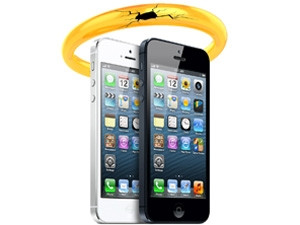
Long-time darling of the smartphone industry, Apple's iPhone is starting to lose much of its charm as technology renovations slow and other entrants start taking a place in consumers' hearts.
This is according to analysts and comes in response to a recent British study they say mirrors local sentiment. According to the study, conducted by a mobile phone comparison site, almost two-thirds of Britons (65%) predict the next version of the iPhone will generate poor sales when Apple releases it later this year.
The study, a poll of 2 007 individuals over the age of 18, was conducted in a bid to determine people's perceptions and attitudes towards the imminent release of Apple's seventh-generation smartphone - most likely the iPhone 5S.
Most of the respondents who said they do not expect the new iPhone to be a success in terms of sales forecast that Samsung would significantly dent its uptake. Over a quarter of survey participants (26%) expected the new iPhone would be too expensive; 23% said Apple doesn't build the quality it used to; 22% said it would be too similar to the iPhone 5; and 19% said people are just not that excited about iPhone anymore.
Apple's first iPhone was launched with much fanfare in June 2007. Since then, the tech giant has been bringing out updated versions, with incremental improvements and changes to software and hardware components. The most recent release - the iPhone 5 - was in September last year.
Aging badly
Arthur Goldstuck, MD of World Wide Worx, says it comes as no surprise that Apple's iPhone is losing its appeal. "Apple missed the mark with the iPhone 5. Despite the success of the iPhone 4S and iPhone 5, relative to expectations they were both disappointing. In both instances the phones showed only incremental improvements over their predecessors."
Goldstuck says the iPhone 4S - Apple's fifth-generation phone - was expected at the time of its release to revolutionise communication as we know it, but "this was never going to be the case".
He says there are a number of signs pointing to the fact that Apple is no longer infallible - "like Apple fans would like to believe it is".
By the time Apple released the iPhone 5, says Goldstuck, Apple fans were starting to get nervous, as other smartphone entrants - like Sony, HTC and Samsung - started to up the ante. "The iPhone has started to be seen as old technology. The halo effect has disappeared and people no longer look forward to the next iPhone, as they once did."
Internal improvements
Mike Sharman, owner of digital communications agency Retroviral, says consumers have been spoilt by constant advancements in Apple's technology, and don't necessarily notice the under-the-hood differences between one iPhone and the next.
"While changes to the phone's hardware may not be as noticeable with each new generation, software changes have been momentous. There is only so much more Apple can do from a hardware perspective now."
He says, however, the iPhone has lost its touch as the number one aspirational phone in SA, with Samsung stealing the limelight.
"The smartphone market has become polarised and very bourgeoisie - especially in SA."
Ian Duvenage, head of ICT at Frost & Sullivan Africa, agrees the brand perception of Apple products has shifted. "There has been a much wider uptake beyond the design and creative community.
"More individuals are experiencing Apple products, and there has been an uptake from multiple points, where the initial intro could be iPad or iPod. Thus the brand equity it held with a small niche market has been somewhat diluted."
Meanwhile, Samsung, Sony and Microsoft have overtaken Apple in the latest Strategy Analytics Technology Brand Preference Index.
The brand preference rating is an indication of the balance between consumers who say they would choose a brand and those who would not, when buying tech products - based on a survey of over 6 100 respondents in the US and Europe.
Locally, notes Sharman, Samsung has managed to win consumers' hearts and dent Apple's market share, largely thanks to its substantial marketing budget.
Share